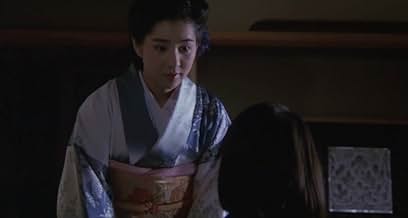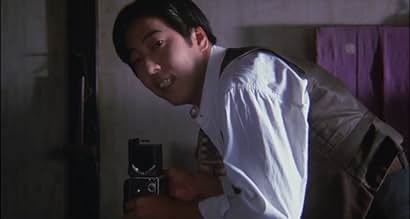VALUTAZIONE IMDb
7,2/10
1846
LA TUA VALUTAZIONE
Aggiungi una trama nella tua linguaThe orphaned Makioka sisters look for a husband for their third sister, Yukiko, as the rebellious youngest sister, Taeko, is kept waiting her turn.The orphaned Makioka sisters look for a husband for their third sister, Yukiko, as the rebellious youngest sister, Taeko, is kept waiting her turn.The orphaned Makioka sisters look for a husband for their third sister, Yukiko, as the rebellious youngest sister, Taeko, is kept waiting her turn.
- Regia
- Sceneggiatura
- Star
- Premi
- 5 vittorie e 9 candidature totali
Yonedanji Katsura
- Okuhata
- (as Kobeichô Katsura)
Michino Yokoyama
- Itani
- (as Michiyo Yokoyama)
Recensioni in evidenza
The Makioka Sisters shows Ichikawa going back to one of the greatest 20th Century Japanese writers, Junichiro Tanizaki. Ichikawa had already directed, in the 1950s, a stunning adaptation of the Tanizaki novel The Key. The Key is an elliptical comedy about erotic fixation, with a lush visual style of saturated colors. The Makioka Sisters is a more subtle and delicate film, attuned as the novel was to the undercurrents running through the highly structured lives of the main characters. In some ways, the novel was Tanizaki's attempt to write a modern version of Murasaki Shikibu's Tale of Genji, and Ichikawa seems to have understood this in his adaptation, which brings a great deal of low-key humor and psychological insight to the proceedings, all very much in the Genji style. Essential viewing.
The Japanese movie entitled Sasameyuki (Light Snow) (1983) was shown in the U.S. with the title The Makioka Sisters. The film was based on a novel entitled The Makioka Sisters, so that change makes sense. The movie was co-written and directed by Kon Ichikawa.
The film takes place in the late 1930's, the years when Japan was a war with China. In retrospect, this was the start of WWII, but people didn't realize that at the time. There are some references to wartime scarcities, but this isn't a "homefront" movie.
The plot pivots on the marital status of the four sisters. Their parents are dead, and the oldest sister is responsible for the family name and the family honor. She's married, as is the second sister.
The third sister--Yukiko, portrayed by Sayuri Yoshinaga, is the shyest and most conservative of the four. The youngest sister--Taeko (Yûko Kotegawa) isn't as concerned about the strict rules of etiquette over which the others obsess. However, protocol dictates that she can't be married until Yukiko is married. So, much of the plot has to do with finding the right husband for Yukiko.
The film has colorful scenes of cherry blossoms and fall foliage. The glorious Japanese kimonos are worn by most women, and they are truly beautiful. (Because of the color and scenery, this movie would work better in a theater, but we had to make do with a DVD.)
Almost everything is serene on the surface of the film, but just under the surface there are intricate attachments and resentments. It's a long and quiet film, but it keeps your attention throughout.
For the record, Sayuri Yoshinaga (Yukiko) is one of Japan's greatest female actors. She starred in over 100 films. In my mind, she's the true star of this movie.
Some critics say that Ichikawa should be considered at the same level as the more famous Ozu, Kurosawa, and Mizoguchi. I don't have the depth of knowledge to know whether or not Ichikawa is the equal of the other three. However, after watching this movie, I know that he's a great director.
This film has an IMDb rating of 7.2, which is pretty good. I thought it was better than that, and rated it 9.
The film takes place in the late 1930's, the years when Japan was a war with China. In retrospect, this was the start of WWII, but people didn't realize that at the time. There are some references to wartime scarcities, but this isn't a "homefront" movie.
The plot pivots on the marital status of the four sisters. Their parents are dead, and the oldest sister is responsible for the family name and the family honor. She's married, as is the second sister.
The third sister--Yukiko, portrayed by Sayuri Yoshinaga, is the shyest and most conservative of the four. The youngest sister--Taeko (Yûko Kotegawa) isn't as concerned about the strict rules of etiquette over which the others obsess. However, protocol dictates that she can't be married until Yukiko is married. So, much of the plot has to do with finding the right husband for Yukiko.
The film has colorful scenes of cherry blossoms and fall foliage. The glorious Japanese kimonos are worn by most women, and they are truly beautiful. (Because of the color and scenery, this movie would work better in a theater, but we had to make do with a DVD.)
Almost everything is serene on the surface of the film, but just under the surface there are intricate attachments and resentments. It's a long and quiet film, but it keeps your attention throughout.
For the record, Sayuri Yoshinaga (Yukiko) is one of Japan's greatest female actors. She starred in over 100 films. In my mind, she's the true star of this movie.
Some critics say that Ichikawa should be considered at the same level as the more famous Ozu, Kurosawa, and Mizoguchi. I don't have the depth of knowledge to know whether or not Ichikawa is the equal of the other three. However, after watching this movie, I know that he's a great director.
This film has an IMDb rating of 7.2, which is pretty good. I thought it was better than that, and rated it 9.
Not being in the mood for a Japanese take on "Masterpiece Theatre" I bailed about halfway through this Kon Icikawa offering. I notice several prior reviewers have compared this film to the works of Ozu. And while it is true that "Sisters" is a family drama, a genre Ozu all but invented in his country, it could not be more different in mood and feel. Where works such as "Late Spring" and "Tokyo Story" are contemplative, sad and often quite funny I found this film to be melodramatic, stiff and occasionally amusing. Perhaps the biggest difference between the two directors is in the pacing. Where Ozu's best films flow, slowly but inexorably, toward a powerful conclusion I found Ichikawa's pacing to be, well, let's use the "Masterpiece" analogy again. Too many indoor scenes that felt like skilled, dramatic readings from Tanizaki's great novel rather than a visual adaptation of it. Which is not to say the film isn't beautiful to look at. Indeed, it is gorgeous, with resplendant costumes and art direction that marvelously recreate Japan on the eve of Disaster (otherwise known as WW2). In fact, it is the look of the film that kept me from bailing sooner. C plus.
"Each sister is engaged in their own affairs, but Ichikawa's film (its Japanese title can be literally translated as "light snow") allots the lion's share to Sachiko and Yukiko, and the matchmaking arrangement preceded by precise calculation of all the conceivable conditions ("background" should be investigated through and through, no mentally disturbed mother-in-law lurking in the dark), the sheer canniness and the business-like action is astounding (death certificates of diseased wife and children are tossed over the dinner table), and Yukiko, played by beloved Japanese actress Yoshinaga with a comely reticence, extraordinarily wears down the mounting pressure and grinding process, to claim her hard-won victory, a good match is worth the wait, especially when eligible ones are few and far between during the wartime; whereas Sakuma, so adroitly embodies Sachiko's diligence and tenuous discomposure under a painstakingly maintained graciousness that comes naturally with age and savoir faire."
read my full review on my blog: cinema omnivore, thanks
read my full review on my blog: cinema omnivore, thanks
I give this film 10 out of 10 as even after seeing it more than 10 times it still moves me deeply. I was 15 years old when I first saw this movie in the theater in Seattle. I went back to see it again a couple of weeks later. The first 13 minutes during the credits is my favorite scene, filmed in Kyoto in Springtime. Read the book for more background. The Kimono worn by the female actresses are amazing. The late Juzo Itami plays the father. All the dialog is spoken in "Osaka-ben" or Osaka dialect, which has a softer sound than Tokyo dialect. You can also hear some Kyoto-ben too ("gomen-yasu" said by a servant upon entering in the first scene before entering the room). This film brings me to tears it is so beautiful. At the end of the first scene, when the camera pans out to the cherry blossoms outside and the music starts...it is cinematic heaven! I am waiting for this film to come out on DVD.
Lo sapevi?
- QuizThe story spans the period from autumn, 1936, to April, 1941, ending about seven months before the Japanese attack on Pearl Harbor. The novel references a number of contemporary events, such as the Kobe flood of 1938, the Second Sino-Japanese War, and the growing tensions in Europe.
- BlooperTaeko is clearly wearing a strapless bra when she's in the bathtub.
- ConnessioniReferenced in Nichinichi kore kôjitsu (2018)
I più visti
Accedi per valutare e creare un elenco di titoli salvati per ottenere consigli personalizzati
Dettagli
Contribuisci a questa pagina
Suggerisci una modifica o aggiungi i contenuti mancanti

























